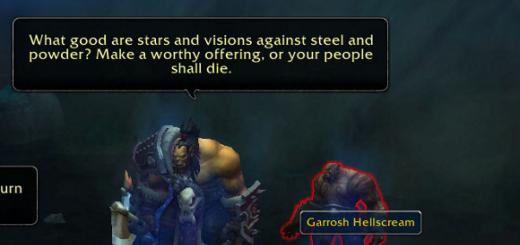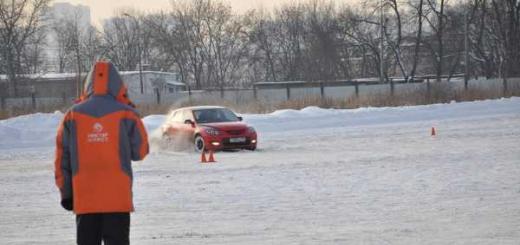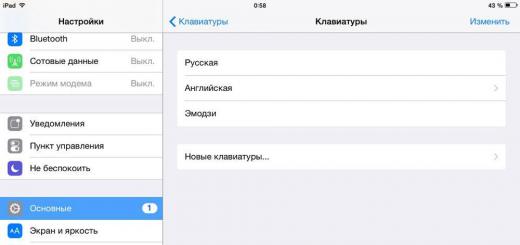Sections: Foreign languages
The purpose of the games: to develop the ability to correctly use species-temporal forms English verb both in oral and written speech, the organization of training students in operating grammatical material at the level of sentences on the grammatical topics “Aspect-temporal forms of the English verb”.
Grammar theme “Present Simple.
Equipment - 13 study cards in size A4. Seven learning cards with pronouns I, YOU, HE, SHE, IT, WE, THEY (for example, red pronouns singular And Brown color plural pronouns) and six learning cards with the verbs DO, DOES, don "t, doesn't, V, Vs (for example, blue).
The grammatical theme is "Present Continuous".
Equipment - 12 training cards. Seven study cards with pronouns and five cards AM, IS, ARE. not.
If students are trained on the grammatical topic “Past Simple”, then cards with verbs change accordingly. (Ved, V, V2, DID, didn't), etc.
The organization of games based on educational cards greatly facilitates the assimilation of grammatical material.
Such training games can be carried out on all grammatical topics related to the tenses of the English verb. For example: grammar games on the topic "Present Simple".
The teacher begins the lesson with the rhyme “I, you, we, they are full of guests!” Next, the teacher calls names, words in the singular and in the plural, inviting students to change these words into pronouns. He also proposes to conduct a frontal check on the recognition of training cards with symbols. The lesson also repeats English time according to the plan:
- Name.
- Action.
- Companion words.
- grammatical signs.
- Correspondence of Russian and English times. Teaching students the ability to distinguish types of English verbs in speech situations in their native (Russian) language
GAME 1. This is my pronoun
A student comes to the board with a training card "I". Students stand up to him with educational cards "DO", "DON" T, "V". So, in turn, all students with educational cards - pronouns and, accordingly, all students with educational cards with verbs go to the board. The task of students who have cards with verbs, don't skip your exit and stand up with your pronoun only.
GAME 2. Make a sentence scheme.
To determine the structure of a simple sentence using visual material, the teacher writes a simple sentence on the board, for example: “He drinks”. Two students come to the board with educational cards "HE", "Vs". To complicate the game, the teacher suggests drawing up diagrams not only of affirmative sentences, but also of negative and interrogative ones. To compose interrogative sentences, educational cards with interrogative words (What, Where, When) are introduced into the game.
GAME 3. Write my verb correctly.
The teacher writes blank sentences on the board. For example:
He .................eat.
We………..dance.
............she run?
............ they skip?
What.........he like?
Students complete the assignment in writing. The task of the students (4 people who have educational cards with verbs (DO, DOES, don "t doesn" t) is to check the correctness of the assignment from the rest of the students, having previously received the teacher's advice.
GAME 5. Choose an offer.
The teacher offers to choose and name sentences from the text according to a given model. For example:
Does he V? (suggestion model)
Does he drink milk? (sentence)
Students come to the board with the necessary educational cards to draw up a sentence scheme. The proposal is voiced by the teacher and students.
GAME 6. Make five sentences!
The teacher distributes cards with printed verbs to all students. A student comes to the board with the pronoun "He". This pronoun will be the subject of the student's sentences. Each student makes 5 sentences (affirmative, negative, general question, 2 special questions), but only with his own verb. For example:
(+) He drinks.
(–) He doesn't drink.
(?) Does he drink?
(Wh-q) What does he drink?
Who drinks?
This exercise can be done orally and in writing. The task of the student who has a pronoun is to help the teacher in checking the correctness of the assignment.
GAME 7. Make questions.
The teacher reads the sentence. Shows question words. Students ask questions to the sentence, starting with these question words. This game can be played orally and in writing. For example:
He drinks milk every day.
Question words (Who, What When)
Such games allow the teacher to correct students' mistakes quickly, along the way, make the learning process easier and less tiring, and this increases the motivation for learning and contributes to a solid learning about the English verb.
The teacher offers to name all the subjects on a topic with the corresponding letter. Whoever names more wins.
Card letters
The teacher distributes 3-4 pictures between students, which depict objects known to them. Then he calls the letter, and the students must raise the corresponding cards to this sound, letter. (You can, as an option, complicate the game. The teacher raises the pictures without naming them. Students must name the word and raise the corresponding letter). Whoever runs out of cards first wins.
Telegrams
The teacher writes the word on the board. Each student must come up with a telegram (one or two sentences), in which the first word begins with the first letter written on the board, the second - with the second, and so on.
The letters crumbled
The word is written in large letters, then cut. Children must collect it. “Guys, I had a word, but it fell apart. Help me collect." The one who collects faster wins. (As a grammatical version of this game, you can use a split sentence. This method is very effective when teaching how to build questions, negatives for different tenses)
3. Lexical games for learning in English
Delete extra word
The teacher offers different cards of 4-6 words. The student must find one extra that is not tied to others on the topic. For example, cow, dog, wolf, sheep, cat, horse - the odd word is wolf - does not apply to the topic "Pets".
What's missing?
Items on a specific topic are laid out in front of the children. Then the students close their eyes, one of the objects is removed. Close your eyes. open your eyes. What is missing?" ( you can appoint a child as a leader)
4. Grammar games
Write "my verb" correctly
The teacher writes several sentences on the board or cards, for example, on the topic of Present Continuous. In places where auxiliary and semantic verbs should be, omissions are put (semantic verb in the form of an infinitive). Students must fill in the blanks. But, after giving 4 children cards “is, am, are, ing”, who walk and check the correct spelling of sentences. For example: "Did you forget to use me?" Here, children must not only choose the right word, but also put it in the appropriate place.
Hide and seek in the picture (prepositions of place).
The teacher pre-selects a picture with an image of any room. One of the students "hides" in this room, for example, under the table. He writes down his place on a piece of paper and gives it to the teacher. Children try to guess where he would hide. The one who guesses becomes the leader.
This is my spot
This game is very effective in learning different tenses and building sentences. Each player is given a card with one of the members of the sentence (I, do, at home, in, and so on). The teacher says the sentence in Russian, and the children should, accordingly, become in the right order.
5. Games to develop listening skills
Guess who came
One student comes to the board, he is blindfolded. Other children from the class come up to him in turn and greet him, ask how things are, get to know each other or practice other lexical topics. The driver must find out who is talking to him now by voice.
Children's drawings
The teacher should give homework in advance, for example, draw his room or family, toys, books. It all depends on the topic being studied. In the next lesson, the drawings are attached to the board (you can use not all, but 3-4). The teacher talks about one of the pictures, and the students have to guess whose picture is being described.
6. Outdoor games, one way or another, are connected with lexical, grammatical or phonetic material.
We listen to the team
For example, the game may be aimed at practicing prepositions. In this case, it is better to carry it out with some object, for example, a high chair. The teacher calls the command and the preposition, and the children perform: on the chair, under the chair, etc.
Reading the map
Children are given empty columns - tables in advance. The whole class is divided into two teams. In turn, one of the participants runs up to the map, finds the desired name there and writes it down on a piece of paper. The team that completes the task faster wins.
Be careful.
Each participant is given a card with a specific word. Children sit in a circle. The teacher names one of them. As soon as the student hears his word, he must stand up, run a circle and return to his place. Those who miss their turn are out.
7. Games for the development of speaking skills
Chain
The teacher starts the story by saying the first sentence. The children continue along the chain. (For example: I get up at 7 o'clock. I take a shower. I have breakfast ....) You can complicate the game like this: each subsequent student repeats all the previous sentences, and in the end, the last one must tell the whole story. Another version of the chain: each subsequent sentence begins with the last word of the previous one.
We write a story.
Participants receive sentences written on cards, they read it on their own, comprehend it, do not show it to anyone. The teacher says the first, and the rest, according to the logical sequence, should insert their own. At the end, the whole story is read correctly.
For preschool and toddlers school age You can often use games in English lessons. For middle and senior management, it is better to include some elements. After all, remember - children, of course, like to play, but gradually they should move on to independent activity, the ability to read a textbook and find information there, use all available resources. Therefore, it is better to find a middle ground between game lessons and learning activities. Then the children will not be bored, and they will master the relevant skills.
This is my nose
Children like to correct the mistakes of others.
Showing his hand, the teacher says: "Oh, something is wrong with my foot!"
Pupils correct “with your hand!”
But the teacher continues:” I don't hear, something is wrong with my nose!”
(pointing to the ear, for example).
Children laugh and correct.
Further, the role of the leader is played by the student, who turns to his classmates in turn. If the called student corrects correctly, he becomes the leader.
How many pages?
The teacher brings some interesting books. And asks:
How many pages are there in the book?
(Pupil 1): There are three hundred and fifty pages.
- No, less.
(Pupil 2): Three hundred.
- Less.
(Pupil 3): Two hundred and fifty.
- More.
(Pupil 4): Two hundred and eighty.
- That's right.
The one who guesses gets the right to be the first to look at the book.
Pantomime
Game to consolidate the vocabulary "Morning of the schoolboy".
A group of children goes to the board and each of them imitates an action with gestures and facial expressions.
Teacher: Guess what each pupil is doing.
Pupil 1: This boy is doing his morning exercises.
Pupil 2: That girl is washing her face.
Pupil 3: This boy is putting on his red scarf.
it. d.
Family
We choose a leader and a group of 5-6 students.
The leading student leaves the class, and the teacher tells each of the group who will play which role (mother, father, son, etc.).
Children start doing things.
The leader returns and, looking at the group of students, answers the questions of the teacher: Who are they? What are they doing?
Clothes
The teacher gives the student 5-7 drawings depicting items of clothing. He shows them to the class, calling them in English.
Then the leader guesses one of the objects, and the children, putting questions in turn, try to guess this object.
Who is the first?
We give each of the playing students a sheet with a drawn chain of squares and a set of cardboard squares with letters of the alphabet.
The teacher (leader) calls a word in Russian or shows a drawing depicting an object.
Students pronounce the word in English, and then lay out the word from the given letters.
The game can be made more difficult if you give the task to make a sentence with this word.
The winner is the one who completes the task first.
My aunt went to town
The teacher explains that the students should complete the phrase My aunt went to town and bought… word., denoting an item of school use or clothing.
Pupil 1: My aunt went to town and bought a book.
Pupil 2: My aunt went to town and bought a book and a bag.
Pupil 3: My aunt went to town and bought a book, a bag and a ruler.
If a student cannot say his word, he is out of the game.
Time
Children are divided into two teams. The game has several options.
1. Take a model of a clock with arrows that are easy to move. Moving the arrows, the teacher asks students from both teams in turn What time is it now? For each correct answer, the team receives one point.
2. The teacher starts the story but does not finish the last sentence. For example, I have a friend. Her name is Anna. She gets up at….
And puts the hands at 7 o'clock. The student repeats the last sentence and ends it with the words seven o'clock in the morning. If he is wrong, the team gets a minus. The team with the fewest mistakes wins.
3. The teacher stops the clock at 7:15 and asks everyone to say what they are doing at that time. The answers might be: I open the window and do my morning exercises at 7:15.
My mother lays the table at 7:15.
4. Using the clock layout, you can repeat or reinforce the use of verbs in the past or future tense. Teacher,
moving
arrows,
asks: What did ypu do yesterday at half past four? What will you do on Tuesday at a quarter to 5?
Crossing the river
On the
blackboard
schematically
pictured
Creek.
Two teams cross it in different places along the pebbles, conditionally marked with squares (10 squares for each team). To step on a stone, in each square you need to enter a word from the topic covered.
If the word is spelled incorrectly or does not match the topic, the team skips a turn.
The team that gets across the stream faster wins.
Game number 1. Zoo.
Game description:
For the game "Zoo" you need to draw animals, cut them out. Make a poster - a zoo, with cages for animals. On each cage write the name of the animals in English.
"There's been a problem at the zoo! All the cages have opened and the animals have escaped! Help! Help, please! Help! Help, please! Can we help find the animals and put them in their cages?" Children must find their own cage for all the animals.
Purpose of the game:
To consolidate vocabulary on the topic "animals", to instill interest in the subject being studied.
Game number 2. What's missing?
Game description:
For the game "What is missing?" you need to lay out school supplies on the table (or you can make drawings and hang them on the board).
Children stand around the table, memorize objects, then turn away, close their eyes. The facilitator removes one of the items and says "What is missing?" (What is missing?). The students turn around looking for the missing item, the first one who saw calls the item in English. (For example: Pen is missing.). This game can be played on any topic being studied (numbers, animals, colors, etc.)
Purpose of the game:
To consolidate vocabulary on the topics studied, to continue work on the development of mindfulness, to instill interest in the English language.

Game number 3. "Don't yawn, do it without mistakes!"
Game description:
For the game "Don't yawn, do it without mistakes!" the children stand at their tables. The host calls the verbs of motion in English (for example: run - run, jump - jump, swim - swim, etc.). Children perform the appropriate movements, those who performed incorrectly, sit in their place. The game ends when the most attentive ones remain. The game can be played with musical accompaniment. This game can replace the physical minute needed in each lesson.
Purpose of the game:
Repetition of words on the topic "verbs-movements", continue the development of mindfulness.

Game "What is your name?".
Game description:
Make cards with the names of the children in English in advance. At the lesson, distribute the cards, ask them to remember your card. Then collect the cards, mix them up and lay them out on the table. Have the children come up and each find their own card. Allow them to take their card and return to their seats.
Purpose of the game:
Teach children how to write their own name, recognize it among others.
The game "Boni is a liar".
Game description:
Put Boni's paper clown on your hand. Say, turning to the children: "Boni is a deceiver. He loves to tell a lie. Now I will begin to name the number of objects on the table, and then I will ask Boni how many objects he sees on the table. And you decide, he says he is deceiving the truth."
Point to three flowers and say: I see (three) flowers. Let the children make sure that there are three flowers on the table. Ask with Bonnie : How many flowers do you see? Bonnie: "I see two flowers!" Tell the children: "Well, you see, Boni is a liar."
Keep asking Bonnie questions, let him cheat, and the children correct him by counting the items on the table.
Purpose of the game:
Consolidation of numerals, develop attentiveness in children, instill love for the subject being studied.
Game "Draw and guess!" (Draw and guess).
Game description:
The teacher quietly tells each child what he needs to draw (furniture or clothes):
Draw a pillow, please. (Draw a pillow, please).
Draw jeans, please. (Draw jeans, please).
After the drawings are ready, the children take turns showing the others their work and asking: What is it? (What is it?).
Other players try to guess what it is and ask, for example: Is it a dress? (This dress?).
After the drawing is guessed, another child shows his drawing.
Purpose of the game:
Consolidation of vocabulary on the topics of clothing, or furniture, develop attentiveness in children, instill a love for the subject being studied.
Game "Do like me!" (Do as I do!).
Game description:
The teacher shows actions and pronounces commands. Children follow the instructions of the teacher.
I wash my face! Do like me! (I wash my face! Do as I do!)
Then the teacher only calls the commands without showing them. Children follow commands. After that, a leader from the children is selected, he stands in front of a group of children and says commands. You can show the following actions:
I wash my face, hands, eyes, ears, nose, lips, head.(I wash my face, hands, eyes, ears, nose, lips, head.).
I brush my teeth. (I brush my teeth.)
I comb my hair. I comb my hair.)
I have a shower. (I am taking a shower.)
I take a soap. (I take soap.)
I turn off the tap. (I turn on the faucet.)
I wipe my hands. (I dry my hands.)
Purpose of the game:
It will help children to consolidate the names of body parts, vocabulary of the lesson and some commands.
Relay-Race game. (Relay race).
Game description:
Children are divided into two teams and stand in two chains one after another. Team captains (the first in the chain) hold "magic" wands-pointers. At the teacher's command "Show me a ..." (for example: Show me a clock!), The first players of each team run up to the picture, find the item named on it and point to it, pronounce its name in English, run back to their team and pass the "magic wand" to the next player, and they themselves become the last in the chain. The following players find and name the same item. the team wins, all the players of which were the first to find the clock in the picture and returned back. The game can be made more difficult by offering each player their own word.
Purpose of the game:
It will help children to consolidate the vocabulary of the lesson and some commands, develops mindfulness in children.
Game "Magic Sack" (Magic Sack).
Game description:
Items related to the theme (for example, fruit models) are placed in a beautifully decorated bag. The child puts his hand into the bag, determines by touch what he took, and calls the object in English. after that he pulls it out and shows it to everyone else. Children determine whether the player guessed correctly or not by saying "Yes" or "No".
the item is then put back and the pouch is offered to the next player.
Purpose of the game:
Help memorize the vocabulary of a given topic, develop attentiveness and instill interest in the subject being studied.
The game "Broken telephone" (Broken phone).
Game description:
Children sit in a line. if the group is more than 8 children, then they are divided into 2 teams, and each team gets one word. The teacher speaks the word or phrase being studied into the ear of one child, the children in a chain pass it into the ear of the player sitting next to him. the last one in the chain must say loudly and correctly the word or phrase that the teacher said. If the word is said incorrectly, who in the chain made a mistake is checked. The teacher asks to repeat this word correctly. The game continues with another word.
Purpose of the game:
Help children memorize words, phrases and pronounce them correctly, develop mindfulness and understanding English speech.
Game "Ball" (Ball).
Game description:
The teacher quietly but clearly pronounces the word to the illustration (for example, Egg-egg) and throws the ball to the child, who catches it and loudly pronounces the word he heard. If the word is named correctly, the teacher asks: "Show it to me" (Show it to me).
The child approaches the picture, looks for and shows the egg depicted there. The teacher says the next word and the game continues.
Purpose of the game:
Memorize the vocabulary of the lesson, the development of mindfulness in students.
Phonetic games:
Target : setting the correct articulation of the organs of speech of students when pronouncing individual English sounds.
1) Playing Airplane . [ v ]
Have you ever played "airplane"? Probably, you spread your arms like wings, leaned forward slightly - and now you are already flying. Little Englishmen also love to play this game. But instead of sound [g], they say sound. let's play "English" airplane:
The plane is traveling up in the sky
vvv-vvv-vvv.
Moving so fast and ever so high
vvv-vvv-vvv.
Over the land and over the sea
vvv-vvv-vvv.
But we always come back in time for tea
vvv – vvv – vvv .
This game can be played with movements, using it as a physical education minute. Only the teacher can speak the verse, and the students can pronounce the sound, but in more prepared groups, all students can learn the verse.
2) Go, my little pony, go! [ ou ]
Have you ever seen a pony? Of course. Ponies are very popular in England. This is why when little Englishmen play they often imagine they are playing with ponies. They even came up with a special rhyme to make the horse run faster:
go , my little pony , go !
Go! Go! Go!
Go, my little pony, go!
go ! go ! go !
gallop , pony , gallop , go !
This game can be played with movements, using it as a physical education minute.
3) Monkey talk . [ð]
It seems to me that you can all portray little monkeys very well - how they build faces, how they chat. Monkeys in an English zoo speak English. And when they pronounce the sound [ð], they try very hard - they try so hard that they show their tongues to visitors. An angry monkey shouts at everyone: “They, they, they”, and the learned monkey speaks like a poet: “ Thee, Thee, Thee»:
Little monkey in the tree
This is what he says to me
“They, they, they
Thee, thee, thee.”
Monkey jumps from limb to limb
While I chatter back to him:
“Thee , thee , thee
They , they , they ”.
Only the teacher can speak the verse, and the students can say the words “Thee, thee, thee, They, they, they”, but in more prepared groups, all students can learn the verse.
Lexical games :
1) How many pages? Target:number training over 20. (III )
The teacher always has a lot of beautiful books on the table. One day he asks the children, pointing to one of the books: - How many pages are there in this book?
Children try to guess: - There are ...
2) Champion Game . Target:consolidation of vocabulary on the topic of the lesson, memory training.
Starting the game, the teacher calls the first word. Each subsequent student must name all the previous words in the order in which they were included in the game, and say a new word. If someone forgot a word or mixed up the order, he is out of the game.
Vereshchagina I.N., Pritykina T.A. English languageII :
Family (lessons 10 - 18) - I have got a mother, a father, an uncle, an aunt ...
Who do you want to be (lessons 19 - 25) - I want to be a driver, a doctor, a pilot…
Games and sports (lessons 55 - 62) - I like to play leap - frog, hide - and - seek, volleyball ...
Vereshchagina I.N., Pritykina T.A. English languageIII :
Food (lessons 28 - 38) - I'd like to eat an apple, sweets, bananas, a cup of tea…
Clothing (lessons 64 - 74) - Yesterday I bought a pair of shoes, a pair of boots, a hat, a cap, a sweater…
3) Let ’ s draw a picture . Target:consolidation of vocabulary on the topics covered.
Each student needs to prepare a sheet in advance, drawn into 20 cells. The teacher names the words on the topics studied (not only nouns, but also adjectives, and verbs, and even phrases). Students must draw! each word, which corresponds to its own cell. Then the teacher calls the number of the cell, and the task of the students is to “restore” the word with the help of their drawing.
Vereshchagin AND. H, Pritykin T. BUT. English languageIII (People in the family, Daily life, Food, Holidays):
My mother's daughter, go to school, sports ground, five o'clock, play chess, birthday, a box of sweets, eggs, take a shower, read books, ice-cream, husband, parents, get up, teeth, breakfast, a cup of coffee, have a party, a present, celebrate.
Grammar games :
1) Hide-and-Seek in the Picture. Target:practice using prepositions of place.
A large picture of the room is required. The driver (one of the students) "hides" somewhere in the picture, writes on paper where he hid and gives it to the teacher. Children, asking the driver general questions, “look for” him in the picture. To make it more like real hide and seek, you can read the saying in unison:
bushel of wheat, bushel of clover;
All not hid, can't hide over.
All eyes open! Here I come.
Vereshchagina I.N., Pritykina T.A. English languageII (Where are your toys?( lessons 44 - 54)):
- Are you under the bed?
- Are you behind the door?
- Are you on the chair?
- Are you in the box?
2) Act as you say. Target: training usepresent continuous.
The task is to execute commands with comments. 3 students play: 1 - gives a command, 2 - performs and says what he is doing, 3 - describes the actions of the second.
Vereshchagina I.N., Pritykina T.A. English languageIII (daily life (lessons 14 - 23)):
1 - Play volleyball. 2 - I am playing volleyball. 3 - He/ She is playing volleyball.
1 - Wash your face. 2 - I am washing my face. 3 - He/ She is washing his/ her face.
1- Do exercises. 2 – I am doing exercises. 3 – He/ She is doing exercises.
3) magic box . Target:consolidation of the use of the studied temporary forms.
The teacher has cards in a bright box. Children draw one card at a time. Task: it is necessary to compose a story (it can be playful), using the verb written on the card, in all known tense forms. The teacher draws a card first and completes the task as an example. If possible, all actions can be illustrated with facial expressions, gestures.
Vereshchagina I.N., Pritykina T.A. English languageIII :
- Take a shower!
I take a shower every day. I am taking a shower now. But I didn't take a shower yesterday because I went for a walk with my dog and came home late. Tomorrow I will take a shower because I will do exercises.
Strong students are the first to respond. After completing their assignment, they can help weaker students or take another card and complete the assignment in writing.
4) Theater . Target:training in the formation of affirmative, interrogative, negative forms of the studied tenses.
The class is divided into two teams. Each team member is given cards - roles with the components of the proposal. With the help of these “roles”, participants ask questions to rivals, rivals answer them, lining up and forming a sentence.
Vereshchagina I.N., Pritykina T.A. English languageIII :
time
do
At
what
you
go
to
school
?
Spelling games:
1) The Comb . Target:consolidation of the studied vocabulary, development of spelling skills.
The class is divided into 2-3 teams. Write a long word for each team on the board. Representatives of the teams take turns running up to the board and writing words that begin with the letters that make up the original word, vertically. Words of one command should not be repeated. The first team to spell the words correctly wins. Words can be of different parts of speech, as long as they are longer than the words of rivals.
m a r a t h o n
o n a u u o r o
t i b g e l a v
h m b u s i n e
e a i s d d g m
r l t t a a e b
y y e
2) Invisible Words. Target:development of spelling skills.
The leader is selected. His task is to write the word, but he “writes” the word with his hand in the air. The task of the rest is to write down the words in notebooks. The winner is the one who correctly wrote down all the words.
3) Remember the Words . Target:formation of spelling memory skills.
Students are asked to quickly look through the list of words, and then name words that contain a given letter. Whoever can name the most words wins.
4) Let ’ s Count Alphabet . Target:alphabet control.
The teacher suggests doing math. But the numbers here are replaced by letters. Each letter has its own serial number (according to alphabetical order). To correctly solve the examples, you need to count the serial numbers of the letters. Answers must also be in the form of letters.
C + R =? 3+18=21 C + R = U
Speech games:
Auditory games:
1) clap – clap . Target:development of skills of semantization of vocabulary by ear, development of memory.
The teacher names the words on the topic studied. Students should clap after each word. If a word from another topic is called, there is no cotton.
Vereshchagina I.N., Pritykina T.A. English languageII :
· Games And sport ( lessons 55 - 62):
Volleyball, basketball, hockey, tennis, leap-frog, gray bird , hide - and - seek ...
· Family ( lessons 10 - 18):
Grandmother, grandfather, uncle, teacher , sister, brother…
2) Which is the picture is? Target:development of listening skills.
In advance, the teacher gives the children the task of drawing the toys that they have at home and where they are for the next lesson. In the next lesson, 3-4 drawings are attached to the board. The teacher describes one of the drawings. The children listen and have to determine what kind of picture they are talking about.
Vereshchagina I.N., Pritykina T.A. English languageII (Where are your toys?( lessons 44 - 54)):
I have got many toys. I have got a big gray elephant. My elephant is on the chair. I have got a small blue - and - white parrot. It is in the box. My sister has got two dolls. They are under the table.
3) good morning . Target:development of listening skills.
1 student comes to the board and turns his back to the class. The teacher gestures at one of the students and he says to the driver: "Good morning, Kolya". The driver, recognizing the voice of a classmate, replies: “Good morning, Masha”. Now Masha becomes the driver and the game continues. To make it harder to guess, students can change their voices. In the very first lessons, phrases of greeting and farewell are used. At an advanced level, these can be micro-dialogs:
- Hello Masha! How are you?
Hello Kolya! I'm fine. thank you.
Speaking:
1) Last Word Chain . Target:development of monologue speech skills, skills of constructing a logically coherent statement.
To start the game, the teacher says the first sentence. The next student must come up with a sentence that would begin with the last word of the previous sentence. If a student finds it difficult, he skips a move, and the move passes to the next student:
Vereshchagina I.N., Pritykina T.A. English languageII (Where are your toys?( lessons 44 - 54)):
I have got a cat.
The cat is grey.
The gray cat is under the chair.
The chair is near the table.
The table is in the room.
Vereshchagina I.N., Pritykina T.A. English languageIII (holidays (lessons 42 - 45)):
I like Christmas.
December is in winter.
Winter is my favorite season.
The season I don't like is autumn.
2) Make a story . Target:the formation of a coherent monologue or dialogic statement and the activation of the relevant skills and abilities.
Each participant receives a card with one sentence from a particular story. He is not allowed to show it to other participants or write it down - he must remember it. 2 minutes are given for this. The cards are then collected and the teacher reads the story. The players listen to it, and then each of them, in accordance with the logic of construction, in turn name their proposal. Strong students get more complex sentences, and weaker ones are simpler.
Vereshchagina I.N., Pritykina T.A. English languageIII (Nature (lessons 91 - 93)):
AT MY GRANDFATHER'S
My sister and I enjoy living in the country. We usually spend our summer holidays at our grandfather's. He lives and works in the forest - he is a forester. He lives in a small house. He has a garden.
Different plants grow in his garden. It's very beautiful there. There is a lake near the house. The lake is full of fish. Near the lake there are high green hills and large fields. A lot of different flowers grow in the fields. The forest is full of mushrooms and berries. Different birds and animals live on the hills and in the forest. Grandfather knows and loves them all. He knows a lot of things about animals: where they live in winter and in summer, what they eat, what they like to do, how they teach their children and play with them.
He knows all about birds, too. When a bird is singing he can say what bird it is. In winter, when there is not much food in the forest, he gives the birds something to eat.
Grandfather likes .the forest. He always says that the forest is full of wonders.
We like to listen to grandfather's stories about the forest's won ders
These games can help you diversify your lessons. Study them - and you will not have to spend time preparing, you will always have an interesting game in reserve.
Don't laugh, don't smile
Think of any subject. The trainer asks questions like:
- What do (did, will, does) you (your friend) eat (for dinner)?
- Where do you usually sleep?
- Who is your best friend?
- Who has helped you?
The student responds without smiling with this word: “I ate (eat) a dog”, “A ball is my best friend.”
The trainer gives his funny comments to the answer (possible in Russian): “Now it’s clear why all the dogs ran away from our city.”, or something like that. Only the one who answers should not laugh, and the more others laugh, the merrier. Do not slow down the pace of questions, maximum questions. Achieve quick responses by reducing communication lag (the time between asking a question and starting to answer).
Recommendations: This game can be played indefinitely, practicing almost all lexical and especially grammatical topics, but taking breaks so that the student does not get used to one game. You can also change: the student asks questions, the teacher with the group answers. You can also ask questions for a mixture of times, but first you need to explain that the answer must be in the same time as the question.
Crosses and spots
For this game, you can use a card, or simply spread out the words on cards or 3 * 3 pictures. When playing, observe the principle of gradualness. The player covers the place with a chip if:
- Named the word in English;
- Translated it into Russian;
- Gave 3 forms of the verb (if it is a Past Ind. topic);
- Compiled a simple sentence, such as “I like horses.”;
- Gave a sentence with an extension: “I like to eat ... for dinner.”, “There is a TVset in the corner of the room.”;
- Compiled a sentence in the 3rd person singular, or in Present Cont .;
- Created a question (general, special);
- Made up a negative;
- Compiled a complicated sentence with if, when, because, for example “He is strong, because he does morning exercises every day.”
Recommendations: “Crosses and spots” are applicable only for students who can confidently play this game in Russian, and who are painless about their own loss. The game is applicable at any stage to raise the emotional tone of the student.
Guess a word (an action) with pantomime
You can work with any lexical topic - even with adjectives.
Puppet-show
Working off colloquial phrases: introduction, greeting, story about yourself, any questions.
Recommendations: This is a game for toddlers and elementary school students with soft toys, voice changing, dressing up. The game can get more difficult at different stages. For middle school students, give the statement: “You are puppet theater actors and show a play to children in kindergarten.”
Chain
The game consists in laying out pictures with actions (nouns, adjectives, prepositions) in a chain. Walking along this chain, the student says simple sentences (you can speed it up):
- I like apples. I like plums. I like...
- He is strong. He is fat. He is...
- He was in the park yesterday. He was in...
- We slept in the fridge yesterday. We ate soup yesterday...
- We wear trousers in autumn. We wear sandals in summer...
- He can jump in the kitchen...
Recommendations: This game is applicable to any grammar topic (He is going to ..., We'll...) If you put an X or? - respectively, negative or interrogative sentences are made. If you put time markers on the picture, you can work out a mixture of times and different types offers. You can give markers or pronouns as the child progresses along the chain, practicing the element of surprise and reducing the communication lag. This increases the effectiveness of the training. To increase the child's interest in the game, make very funny sentences (for example, you can “mix up” the seasons, location, never, sometimes ...).
Transformation
The purpose of this game is to practice the speed of modification of various grammatical structures. The essence of this game is best explained by the following example:
Level I: “I clean my teeth.” -> She -> “She cleans her teeth.” -> They -> “They clean their teeth.” -> Not -> “They don’t clean teeth.” -> He -> “He doesn’t clean teeth.” -> Why -> “Why does he clean teeth?” -> Where -> “Where does he clean teeth?” -> We -> “Where do we clean teeth?” ->
Level II: Now -> “Where is he cleaning teeth?” -> Yesterday -> “Where did he clean teeth ...
For each correct answer, the student receives a chip, whoever gets the most chips wins. If it becomes difficult to continue, you can take a new model and work with it.
Puzzle
This game, as a rule, ends a lexical or grammatical topic. The student is asked to write a mini-story like "Puzzle". After the student's story, consisting of individual sentences on a given topic, his partner must guess what or who was encrypted. In the topic “Appearance” this is a person - the hero of a fairy tale, film or cartoon, an actor, singer, classmate; in the topic “Animals” this is some kind of animal; in the topic “Food” - any product or dish; in the topic “City” - some famous city, etc.
Recommendations: Repeat the whole cycle many times to achieve fluency in the use of vocabulary, give reward points for the most complete story at a good pace. Use the repetition of the topics covered to increase the tone of students and excitement in the game.
Cards
This game uses cards with 3 types of words: semantic verbs, adjectives and nouns. Before starting the game, select the cards you need (already known to students) for a separate part of speech or for a mixture. Each player takes 3 or 4 cards. The rest of the cards remain in the "bank". The first participant moves, the second “interrupts the move”, choosing from his cards any one with which you can make a proposal together with the one that the first player was like. If the proposal is made correctly, the student who made it takes both cards to himself (to his points). If the proposal is incorrect, the walking participant loses his turn, and the next player makes an offer with either three or two cards, and in case of a correct answer, he takes them to himself (to his points). If one of the players wants to score a large number of points at once, he must put his 2 or 3 cards on his turn, which he must combine in one sentence. It is advisable to make funny sentences. After each round, all participants take 3-4 cards from the bank.
Recommendations: The rules in this game can be modified depending on what goal you are pursuing (what time or mixture of times is worked out, denial, questions, ...) You, too, at the beginning of the game must take part in it as one of the players, but slowly yield to students, achieve excitement.
teacher
This game can be used multifunctionally. The game begins with the fact that you choose a student to be a teacher, and he teaches part of the lesson for you. Beforehand, of course, you must clearly articulate to him what needs to be done:
- Throwing the ball, check the words and their translation from Russian into English and vice versa;
- Ask questions in English, giving out tokens for the correct answer;
ten things
This is a conditional name of the game, the essence of which is that all participants draw 3 - 5 - 10 objects, and, having exchanged their drawings, write or say what their partner will do (does, has already done, etc.) with these items. Suggestions can be funny. You can ask questions about these items, you can say or write what will not be done with these items.
You can complicate the conditions of the game: one participant draws 3 - 5 objects, the other writes the same number of actions. Then both drawings are connected together and the resulting sentences are compiled. For example, the first was Tvset, and the action was jump. Suggestion: I jump over (on) Tvset with my brother/
Another version of this game - everyone writes 5 - 7 names of subjects, and the teacher asks: “What will you take for a trip? And why?” or “What did your mother give you as a birthday present and why?” Questions can be the most unexpected. Participants answer, trying to explain logically, based on the list of items that they have. You can make funny comments along the way.
You can also draw or write 3 - 5 - 10 actions (regular verbs) and exchange sheets, after which “foretell the future” to each other. There are some very interesting predictions. Moreover, you can change the setting: “What had he done, before guests came?”, “What did you do on the Moon” (it all depends on the grammatical tense).
Recommendations: This is a very effective game, used both in the oral lesson and in private lesson. When using this game in an individual lesson, it is necessary to give all participants the opportunity to read the resulting sentences (to maintain interest).
dictations
Instead of the traditional dictation, you can use a whole chain of spelling games:
- Write any combinations of sh, skate, ch, a, wh, th, w, and below them ask the student to write any words with these combinations. You can give 1 - 2 combinations, you can 4 - 6, depending on age and level of training. But do not overdo it: the student should be interested and not very difficult. Combinations can be given immediately after going through the rule in the booklet, but make sure that the student already writes well and collects these words from the cut alphabet. For first graders, use this method only in exceptional cases.
- Write several letters on a piece of paper, for example: s, k, t, ... The student's task is to write words starting with these letters.
- After students read the text or perform listening, you can give the task to compete who will write more words from the text, excluding and, but, I, he, etc.
- In the process of studying any lexical topic, you can give the task: Who will buy more products (Food), who will visit more places (City).
These tasks are very effective for students of all ages. For the advanced level, the conditions become more difficult.
Offers for expansion
They are carried out in writing or orally according to a separate proposal or picture. Before starting, show the student how to do it in Russian, demonstrate the possible “extensions”:
- adjectives;
- of, for, with, direct and indirect objects;
- Circumstances of place (where), time (when), course of action (willingly quickly), conditions (if, because).
The element of competition is that it is necessary to compose the longest (by number of words) sentence. This exercise can be done orally, expanding one by one: I bought flowers. - I bought beautiful flowers. - I bought flowers for my sister. And so on, as long as there is room for expansion.
Change the story
Based on the story, it is necessary to change some words to get a new one, slightly changed: instead of in the morning - in the evening; an old man - a young girl; quickly - slowly; ...
Write a story
Write different words (nouns, adjectives, verbs) and some expressions (in the morning, at last, ...) and have them make up a story with them. Element of competition: whoever has the most interesting or longest story wins, etc.
Music Passage
A student or trainer brings several cassettes with different pieces of music. the coach puts passages that are different in their orientation. They listen for 1 minute, then the student tells what images or memories were inspired by this music. All types of music can be used.
Maze or Empty blocks
To play, you need a dice dice and some chips. One of the options for playing the "Labyrinth" is selected (cells can be for prepositions, for adjectives, for verbs, or empty). Students in a pair take turns throwing a die, moving across the field according to the points that have fallen out, making sentences with words in a cell, according to the grammatical topic being studied. The trainer can give the task to make up questions, negatives, or statements with interrogative words, or for a mixture of tenses (alternating cards with markers that lie side by side). When working with empty cells (Empty blocks), you can use any color pictures on any lexical topic, which are drawn from a stack of cards lying nearby. If the student does not make a mistake, he moves forward. If he makes a mistake, he takes a step back. Game conditions can be changed.
Bingo
A field with many pictures is placed in front of the student. Compiling a sentence with the pictured word, the student covers this picture with a chip. The goal is to fill in a horizontal or vertical row of pictures. Tasks can be on any lexical or grammatical topic. The partner controls the game, and if he notices an error in the sentence, he does not allow him to put a chip.
ball game
Two students in a room practical exercises throw the ball to each other, seeking to eliminate the delay in communication. Tasks can be different: a) Translation of words from Russian into English and vice versa on any topic, b) Answering questions, c) Compiling a simple sentence with a given word on a given grammatical topic, d) Compiling a similar statement, etc.
Card game
Two students receive cards on any grammatical or lexical topic. The cards are divided in half and dealt to the players. One makes a move, lays down a card, and makes an offer with his card. The other "interrupts" him, laying down his card and making up his proposal. Errors are controlled and not counted. Whoever has no cards left wins.
Magic Pouch
It is very convenient for a teacher to have a box with all sorts of objects in his room: a cone, an old candlestick, a wallet, an interesting box, a kinder surprise toy ... and anything unusual, fun. These things must be in a closed box and the student must not see them. Before the lesson, the teacher can put several items from this box into the bag and invite students to guess these items by asking questions on the grammatical topic they are studying, or previously studied grammatical topics. If the teacher wants to fix a certain topic in affirmative sentences, he explains to the student the task, what they call, what he did yesterday, last summer, on vacation, on vacation with this subject “You cut it yesterday|last summer”, he answers “yes” or not". The student guesses the object after a while. You can use this game at any level, even on the first topics of “to be” (what object - color, size, material, where it usually is), who has it more often (grandmother, girl, child). You can use this version of the game - one of students, without looking into the bag, describes the object by touch. Other students ask questions or make statements about him, he denies or confirms. Emphasis on the game, interest, communication in English, the use of structures, and not on what we actually do with this subject in life.
Guess who said?
This game is used during the study of the topic "Direct - indirect speech"
One person leaves the room, others (students and teacher) say one phrase at a time and choose a leader. The student who came out returns and the leader says to him: “Someone said that ....” (and substitutes the phrases that the participants said, making the changes that are needed when translating from direct to indirect speech).
The student who entered guesses who said what, and voices it: "Vasya said that ..."
This is a lot of fun, the students try to confuse the newcomer by coming up with phrases that, logically, should come from another person (it is known that Vasya is fond of singing, and therefore Petya says that he loves to sing. So they try to confuse).
At first, they work only with affirmative sentences, then the tasks become more difficult: interrogative and negative sentences. The same is true with times.
English teacher at Bilim Innovation Lyceum for gifted children. Teacher blogger, trend researcher. She writes on the Proactive.teacher Instagram channel about modern teaching techniques and methods, and shares book reviews. Fan of personal efficiency.
What to do if your students come to class tired? For example, if it's Monday morning, or if your lesson came next after a difficult algebra test?
Kinetic games provide your students with the energy they need and add variety to your English class. Using outdoor games, or simply allowing students to move in your lesson, is a great way to activate their creative abilities, develop their physical and intellectual qualities, such as dexterity, attention, observation, logical thinking.
These exercises and games can be adapted to different ages, but are mainly designed for students in grades 7-9, with an elementary, pre-intermediate level of English.
Game "Fly Swatters"
For this game, the teacher prepares cards with learned or new words in advance and attaches them to the board. We also need one judge who will count the points of the teams.
The students are divided into two teams. The teams line up in two lines. The first two students from the teams come closer to the blackboard. The teacher gives them fly swatters. Then the teacher calls the word in Russian and the task of the students is to hit the card with the English equivalent as quickly as possible, “slam” this word. The one who was first brings one point to his team and passes the fly swatter to the next player on his team. The student from the other team, who did not have time to hit the word first, remains at the board until he hits the next word first. If students hit a word that is not the correct translation, they lose one point.
Dance to Classroom Energizers video
The Learning Stations (YouTube) channel contains English children's songs and energetic dances.
These dance instruction videos are not only an opportunity to practice English, but also a break from learning grammar.
Change the arrangement of desks and play Taboo
It is about organizing the work of children. In some classes, it will be more interesting for students to work in groups, sometimes you can remove all the desks altogether, sit in a circle and play Taboo.
Rules of the game: the teacher prepares cards with words in English in advance, for example, 30 words for the last unit, then the students take these cards in turn and try to explain them in other words, that is, to convey the meaning of the word without naming it. For example, on my card there is the word "Ambitious", this word can be explained as follows - "A person who wants to be successful". The one who guesses the word receives a card. The student with the most cards wins.
Change "seated activity" to "walk around" activity
Can arrange Mingling- this is when students take cards with questions on Speaking, move freely around the classroom, ask each other questions in English and fill out their cards.

You can give all students such tables as "Find a person who ..." and they can just walk around the classroom, ask questions and mark on their lists of classmates who, for example, can swim or play a musical instrument. Or you can divide the students into pairs and give each card A and B, the student with card A will ask questions to the student with card B, and vice versa.
You can play basketball
It's also a good idea to go outside of the classroom, such as into the school lobby, courtyard, or gym. In the gym, you can divide the students into two teams, give each team a basketball, and assign a leader. The leaders will take turns calling the definitions in English, and with the correct translation, the students get the right to throw the ball into the basket (+1 point for hitting and +1 for correct translation of the word).
M&Ms activity
For this game you will need two packs of M&Ms. You prepare in advance cards with tasks on the colors of the pills, for example,
- Red - tell us about your hobby.
- Yellow - Tell us about your family.
- Brown - tell us about your plans for the summer.
Then you divide the students into two groups, ask each group to stand in a circle, give them M&Ms and a task card. In turn, the students help themselves to a dragee and, depending on the color, speak for a minute on a certain topic.
Pin a reading assignment on the wall
Instead of giving children the task of reading the text in the textbook, you can transfer these texts to the walls in the classroom or outside. In this way, you will give students the opportunity to move and discuss assignments.
Running dictations
You can play Running dictations, divide students into pairs and invite them to choose roles, one of them will write down information (writer), and someone will find it (reader / runner). The teacher turns on the timer. The first student comes out, reads the information, tries to remember it and pass it on to his partner. The partner writes down the information, and then the teacher checks who completed the task faster.
Teaching English grammar through games is one of the most interesting, exciting and effective methods. The most effective games in the process of learning a language are those that train individual structures. These games not only practice structure, but do it in an enjoyable, easy way that makes students forget that they are learning grammar. They help you focus on enjoying the game. These are games in which there is a training of general, special, divisive questions, comparative and superlatives adjectives, adverbs, modal verbs, pronouns, etc. Games increase students' knowledge of grammar through communication. With the help of grammar games, communication skills can be developed, as students get the opportunity to use the language in semantic situations. The games in this manual are aimed at developing many linguistic skills: listening, speaking, reading and writing. But they all affect grammar.
I "VE BEEN TO JAPAN.
Level: Elementary.
Purpose: This game is aimed at reinforcing the Present Perfect in questions and statements.
Time: 15 minutes.
Materials: photocopy of the working page.
Grammar: - Why have you written ... ?
- I "ve written ... because I have (been) ....
Vocabulary: relative, expensive.
Game algorithm:
1. Make copies of the worksheet (one per student) from page 54.
2. Students work independently, enter short answers (word, phrase) to questions in any square (out of order!)
3. Then the players work in pairs, they change work pages and ask each other questions, starting each question with the words Why have you written...?
4. The player who was asked the question must explain why he wrote this word or phrase, and be sure to add any additional information on the topic.
5. At the end of the game, students work in a group and talk about the most interesting information that they have perceived.
Free download e-book in a convenient format, watch and read:
Download the book English grammar in games, 53 Grammar Games, Predko T.I., 2014 - fileskachat.com, fast and free download.
- English, Textbook for the 7th grade, institutions of general secondary education with Belarusian and Russian languages of instruction, Demchenko N.V., Sevryukova T.Yu., Yukhnel N.V., Naumova E.G., Maneshina A.V. ., Maslenchenko N.A., Rybalko O.N., 2019 - Approved by the Ministry of Education of the Republic of Belarus. English language books
- English language "excellent", Grade 8, Manual for students, Kotlyarova M.B., Melnik T.N., 2018 - The proposed manual contains rules and exercises on English grammar for practicing lexical and grammatical skills in 8th grade students , as well as … English language books
- English Vocabulary in Use, Advanced Book with Answers, Vocabulary Reference and Practice, O'Dell F., McCarthy M., 2017 - This book has been written to help you expand your vocabulary at the advanced level. You already know thousands of … English language books
- English in nonsense, A textbook for serious children and cheerful parents, Durymanova T.L., 1997 - An entertaining textbook on English for children and adults who begin to learn this language explains in an accessible and entertaining way ... English language books
The following tutorials and books:
- English with A. Conan Doyle, The Hound of the Baskervilles - Each text is divided into small passages. First comes an adapted fragment of the text with a literal Russian translation interspersed in it and a small ... English language books
- English, Basic Rules, 2003 - The guide contains all the basic rules of English grammar studied in grades 5-11 of a comprehensive school in accordance with the new ... English language books
- English, Burenkova O.V., Mitroshina E.E., Rubina M.G., 2008 - The manual is intended for first-year students enrolled in the bachelor's program of the part-time department in the specialties 08010565 Finance and credit, 080109651 Accounting ... English language books
- English in games, puzzles, charades, Stepanov V.Yu., 2014 - This manual is aimed at preparing students for passing the final certification in English for the elementary school course. The guide offers… English language books
Previous articles:
- Just English, English for Lawyers, Basic Course, Tumanova Yu.L., Koroleva-MakAri V.A., Sveshnikova M.L., Tikhomirova E.V., 2002 - A new revised and expanded edition of the textbook prepared by the teaching staff Department of English for Humanitarian Faculties of Moscow State University. M. V, ... English language books
- English for children without teachers, Part 7, Putilina E.N., 2015 English language books
- English for children without teachers, Part 6, Putilina E.N., 2015 - An interactive course on learning English for preschoolers 5-7 years old without teachers. With this course, parents will be able to introduce their child to… English language books
- English for children without teachers, Part 5, Putilina E.N., 2015 - An interactive course on learning English for preschoolers 5-7 years old without teachers. With this course, parents will be able to introduce their child to… English language books











